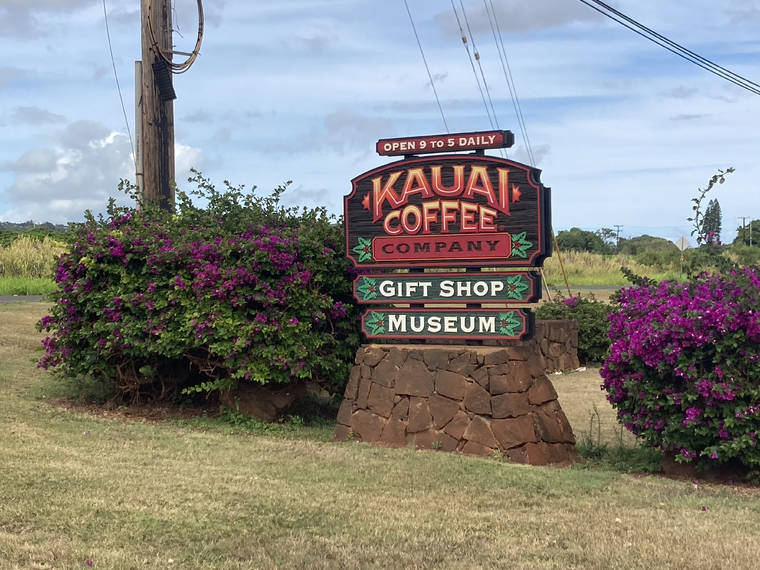KALAHEO — The Kaua‘i Coffee Company, the nation’s largest coffee farm, has earned three certifications guaranteeing increased worker and environmental protections.
It’s now projected to reserve up to $200,000 for community development in 2022, too, according to General Manager Fred Cowell.
“We’re moving toward a community-service organization disguised as a coffee company,” he said.
The company announced in May receipt of certifications from Fair Trade USA, The Rainforest Alliance and The Non-GMO Project. It began stamping its 100% Hawaiian coffee products with the organizations’ labels in June.
Now, the farm must observe a litany of stringent policies to retain the stamps of approval from Fair Trade and The Rainforest Alliance. This includes the creation of a worker-controlled committee that will oversee the disbursement of Fair Trade-mandated community-development funds, or the Fair Trade Premium.
“The Fair Trade Committee has to be represented by both men and women,” Cowell said. “It has to have proportional representation from all parts of our organization.”
Management is kept off the committee, although Cowell serves as a non-voting observer to ensure compliance with Fair Trade mandates. He said the group has already conducted a company-wide needs assessment and is now determining an appropriate course of action.
“In broad terms, 50% of the premium is going to go outside the company to the community, and it’ll primarily be aimed at other nonprofits,” Cowell explained, “and 50% of it can be spent within the company.”
This allows Kaua‘i Coffee Company workers to use premium funds to improve their own working and living conditions, in addition to fueling outside causes they deem important. Ideas currently under review include partnerships with local farmers to combat food insecurity and a car-wash initiative to clean personal vehicles dirtied at the farm.
The Fair Trade Premium is generated by the company’s productivity: It must add 20 cents to its workers’ community-development fund for each pound of unroasted coffee harvested. This means every 100-pound bag sent to the roasters adds $20 to the pot. According to Cowell, market forecasts indicate employees could add $150,000 to $200,000 to their Fair Trade Premium in 2022.
The journey toward certification hasn’t always been easy for company management.
Both Fair Trade and The Rainforest Alliance hold participating businesses to standards that exceed those mandated by the U.S. Department of Labor’s Occupational Safety and Health Administration, Cowell said.
“Most of the criteria that are either Fair Trade or Rainforest Alliance are built around the needs of other coffee-producing countries, where they don’t have the infrastructure we do,” Cowell said.
“But I was pleasantly — and sometimes unpleasantly — surprised that the criteria were rather strict and difficult for us to comply with. We said ‘OK, it’s for the good of the workers. Let’s get going.’ So we learned a lot of stuff.”
Such changes included shortened workdays and employee showers. Pesticide use, already tightly controlled on the farm, has been curbed ever further. Sustainable orchard- and pest-management plans have also been implemented.
Cowell hopes consumers will respond favorably to the certification labels and the meaning behind them.
“When we looked at this, we said, ‘We don’t think it’s going to make a difference in our profit margin,’” he said. “The only thing that we can anticipate is it may make a difference in our demand.”
•••
Scott Yunker, general assignment reporter, can be reached at 245-0437 or syunker@thegardenisland.com.


